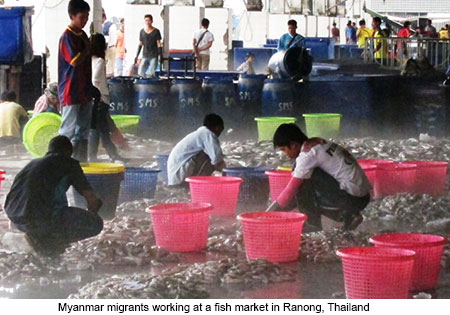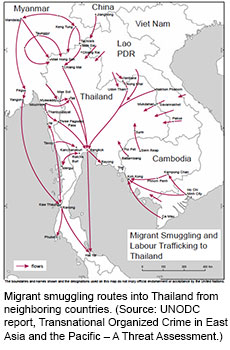
Yangon (Myanmar), 19 July 2013 - Across Myanmar and the Greater Mekong Sub-region, rapid growth and persistent economic disparity drive large flows of migration, through both legal and illegal channels. Each year, an estimated half a million migrants - the vast majority of them from Myanmar - are smuggled into Thailand, according to the UNODC report,
Transnational Organized Crime in East Asia and the Pacific - A Threat Assessment.
"Migrant smuggling is a high-profit, low-risk big business. It is also a deadly business," says Mr. Jason Eligh, UNODC Myanmar Country Manager. "It makes people vulnerable to human trafficking and the risk of death. If you prevent migrant smuggling, you help prevent human trafficking, and can save lives."
While formal migration channels do exist, many migrant laborers prefer to enter Thailand irregularly as complying with the legal channels can be expensive and time consuming. As a result, it is estimated that up to 85 per cent of the country's illegal migrants turn to smugglers to facilitate their entry and help them find work. While many migrants who slip through Myanmar's borders end up in Thailand, the nation is also an important point of transit for people being smuggled to China, Malaysia, Australia, New Zealand and Canada.
Though many irregular migrants earn higher wages than they would have at home, the precarious nature of their status means that they often become victims of exploitation.
"Away from their home communities and in their host countries illegally, smuggled migrants have little basis for asserting their rights as workers, including the basic right to be paid for their labour," says Mr. Eligh. "In extreme cases, they may be trafficked, not paid, or deprived of their freedom. Such abuse is often not reported for fear that filing a complaint may lead to a visit from the police."
 At present, UNODC is in the process of developing a Country Programme for Myanmar in conjunction with the Government of Myanmar. A key pillar of this will be the sub-programme, Countering Organized Crime and Improving Border Security. Within this, UNODC will work with the Government of Myanmar and other relevant stakeholders to address, among other things, the challenges and minimize the impacts of migrant smuggling, trafficking in persons, border management, anti-money laundering, environment crimes and illicit drug trafficking.
At present, UNODC is in the process of developing a Country Programme for Myanmar in conjunction with the Government of Myanmar. A key pillar of this will be the sub-programme, Countering Organized Crime and Improving Border Security. Within this, UNODC will work with the Government of Myanmar and other relevant stakeholders to address, among other things, the challenges and minimize the impacts of migrant smuggling, trafficking in persons, border management, anti-money laundering, environment crimes and illicit drug trafficking.
"More than 12,000 km of borders divide Myanmar, Cambodia, China, Lao PDR, Thailand and Viet Nam. This represents 12,000 km-worth of opportunities to smuggle people, drugs, natural materials and other illicit goods throughout the region," notes Mr. Eligh. "While Myanmar does not have specific legislation criminalizing migrant smuggling, there are a number of instruments in place that are relevant to the issue within the current domestic legal framework."
Through its PATROL programme UNODC currently works with the Greater Mekong Sub-region governments, including Myanmar, to develop cross-border cooperation at Border Liaison Offices, and to train law enforcement and immigration personnel to more effectively address migrant smuggling and its challenges.
As part of these activities, UNODC is engaged in anti-smuggling training for Myanmar border officers stationed near the frontier towns of Tachilek in the North and Kawthong in the South, across the river from Ranong, Thailand. Both are renowned hot-spots for various forms of illicit trafficking.
Background:
The UNODC Country Office in Myanmar is mandated to assist Myanmar in its efforts to provide for the health, security and prosperity of its people, in the face of threats posed by illicit drugs, crime, terrorism, and corruption. With respect to human trafficking and migrant smuggling, UNODC's mandate is to promote global adherence to the United Nations Convention against Transnational Organized Crime and its protocols against migrant smuggling and human trafficking, and to assist states in implementing these instruments.
Established in 2010 to improve border security at land borders in the Greater Mekong Sub-region (GMS), UNODC's PATROL programme is a joint initiative of the
United Nations Office on Drugs and Crime (UNODC), the United Nations Environment Programme
(UNEP),
FREELAND Foundation and
TRAFFIC in partnership with the GMS governments of Cambodia, China, Lao PDR, Myanmar, Thailand and Viet Nam. For more information on the PATROL Programme, please click
here.